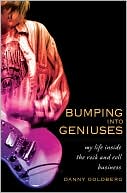Here, There and Everywhere: My Life Recording the Music of the Beatles
Geoff Emerick became an assistant engineer at the legendary Abbey Road Studios in 1962 at age fifteen, and was present as a new band called the Beatles recorded their first songs. He later worked with the Beatles as they recorded their singles “She Loves You” and “I Want to Hold Your Hand,” the songs that would propel them to international superstardom. In 1964 he would witness the transformation of this young and playful group from Liverpool into professional, polished musicians as they put...
Search in google:
Geoff Emerick became an assistant engineer at the legendary Abbey Road Studios in 1962 at age fifteen, and was present as a new band called the Beatles recorded their first songs. He later worked with the Beatles as they recorded their singles "She Loves You" and "I Want to Hold Your Hand," the songs that would propel them to international superstardom. In 1964 he would witness the transformation of this young and playful group from Liverpool into professional, polished musicians as they put to tape classic songs such as "Eight Days A Week" and "I Feel Fine." Then, in 1966, at age nineteen, Geoff Emerick became the Beatles' chief engineer, the man responsible for their distinctive sound as they recorded the classic album Revolver, in which they pioneered innovative recording techniques that changed the course of rock history. Emerick would also engineer the monumental Sgt. Pepper and Abbey Road albums, considered by many the greatest rock recordings of all time. In Here, There and Everywhere he reveals the creative process of the band in the studio, and describes how he achieved the sounds on their most famous songs. Emerick also brings to light the personal dynamics of the band, from the relentless (and increasingly mean-spirited) competition between Lennon and McCartney to the infighting and frustration that eventually brought a bitter end to the greatest rock band the world has ever known. Publishers Weekly Emerick was a fresh-faced young engineer in April 1966 when producer George Martin offered him the chance to work with the Beatles on what would become Revolver. He lasted until 1968, when tensions within the group, along with the band members' eccentricities and the demands of the job, forced him to quit after The White Album, exhausted and burned out. In this entertaining if uneven memoir, Emerick offers some priceless bits of firsthand knowledge. Amid the strict, sterile confines of EMI's Abbey Road studio, where technicians wore lab coats, the Beatles' success allowed them to challenge every rule. From their use of tape loops and their labor-intensive fascination with rolling tape backwards, the Beatles-and Emerick-reveled in shaking things up. Less remarkable are Emerick's personal recollections of the band members. He concedes the group never really fraternized with him-and he seems to have taken it personally. The gregarious McCartney is recalled fondly, while Lennon is "caustic," Ringo "bland" and Harrison "sarcastic" and "furtive." Still, the book packs its share of surprises and will delight Beatle fans curious about how the band's groundbreaking records were made. (Mar.) Copyright 2006 Reed Business Information.
\ Publishers WeeklyEmerick was a fresh-faced young engineer in April 1966 when producer George Martin offered him the chance to work with the Beatles on what would become Revolver. He lasted until 1968, when tensions within the group, along with the band members' eccentricities and the demands of the job, forced him to quit after The White Album, exhausted and burned out. In this entertaining if uneven memoir, Emerick offers some priceless bits of firsthand knowledge. Amid the strict, sterile confines of EMI's Abbey Road studio, where technicians wore lab coats, the Beatles' success allowed them to challenge every rule. From their use of tape loops and their labor-intensive fascination with rolling tape backwards, the Beatles-and Emerick-reveled in shaking things up. Less remarkable are Emerick's personal recollections of the band members. He concedes the group never really fraternized with him-and he seems to have taken it personally. The gregarious McCartney is recalled fondly, while Lennon is "caustic," Ringo "bland" and Harrison "sarcastic" and "furtive." Still, the book packs its share of surprises and will delight Beatle fans curious about how the band's groundbreaking records were made. (Mar.) Copyright 2006 Reed Business Information.\ \ \ \ \ Library JournalWhat more can be written about the Beatles? If you happen to have spent most of your formative adult years recording them alongside producer George Martin, quite a bit. With an amazing memory for detail, Abbey Road engineer Emerick paints vivid pictures of a decade of intense recording sessions that quite literally shook the world and of the attendant strain on those who made and shaped the music. Charmingly geeky tech talk abounds, which will prove a little heavy going at first for Beatles novices, though hard-core Fab-o-philes will eat it up with a spoon. Thankfully, Emerick is not above a little dishing: though he's an admitted Paul partisan, each of the Beatles's cuddly public personae gets a reality check. (And, boy, must Yoko's ears be burning!) All in all, Emerick's sincere love for the Beatles and their music shines through. This would make a good fly-on-the-wall companion to the The Beatles Anthology and Bob Spitz's recent The Beatles, or could partner with George Martin's All You Need Is Ears for a look behind the control room glass. Recommended for larger public and academic libraries. [See Prepub Alert, LJ 12/05.]-Matthew Moyer, Jacksonville P.L., FL Copyright 2005 Reed Business Information.\ \ \ Kirkus ReviewsThe Fab Four's sound engineer, present from their first single to their final album, tells all about sharing studio time with the biggest rock band in history. Raised in North London, Emerick became enamored with recorded music as a tot, and with recording it as a teen. A combination of luck and persistence led to his first job, at age 16, at EMI Studios (later renamed Abbey Road), where he spent the next few decades. Within a month, he witnessed the first recording session of a quartet of scruffy Liverpudlians; just three years later, he was thrown into the fire as their sound engineer, working under the legendary "Fifth Beatle," producer George Martin. Decades of all-night recording sessions, simultaneously invigorating and frustrating, followed, and album upon album of innovative, groundbreaking pop classics were recorded, peaking with the universally adored Sergeant Pepper's Lonely Hearts Club Band and falling to a painful nadir with the spotty Abbey Road. The author writes little of his personal life outside the studio, as he seemed to live and breathe his work. In the end, the reader knows the Beatles about as well as Emerick did-that is, not all that well, as he repeatedly admits. Admirably evenhanded, Emerick makes no secret of his affinity for Paul, whom he characterizes as polite and good-natured, but remains diplomatic when discussing each Beatle (and even Yoko). This British politeness at times works against the book, which can be dry. Overall, however, Emerick provides an informative introduction to the creative process of the 20th century's most influential rock musicians. Extremely technical and sure to alienate non-geeks, but nonetheless an illuminating chronicle.\ \








